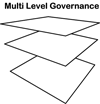A first inter-disciplinary research workshop on multi-level governance in South-Eastern Europe, organised by the Institute of Economics, Zagreb and SEERC, was held in Zagreb on 4 – 5 February 2005. This second research workshop, mainly funded by the Friedrich Ebert Stiftung office in Croatia, will continue to explore approaches to multi-level governance, in the context of the European Union’s engagement with the countries of South-Eastern Europe, with particular reference to social policy and cross-border co-operation and development.
Discussion will be framed in terms of the development of meaningful inter-disciplinary research utilising insights from cultural and post-colonial theories and perspectives. Papers will explore the complex relationship between the development of innovative, reflexive and experimental forms of governance and new forms of regulation and control based upon constructions of Europe and its ‘Others’. In particular, they will address the importance of a politics of scale, focusing on the tension inherent in attempts to spatialise authority in the face of trans-scalar processes and flows (within and between international, national and sub-national actors; within and between state and non-state actors; with an increased role for so-called ‘new intermediaries’; and so on).
This workshop will explore how far ‘new’ understandings of ‘the social’ within Europe, and discourses and practices around ‘borders’, separately and together, reconstitute the relationship, in John Clarke’s words, “between people and power; between state(s) and societies; (and) between forms of ‘representation’ and modalities of decision-making” (Clarke, John (2005) ‘Reconstituting Europe: governing a European people’). In setting out a number of research questions, the workshop will focus primarily on ways to understand how governance works in the new Europe and, specifically, in the European Union’s encounters with South-Eastern Europe, as trans-national and trans-local models and practices of intervention, experimentation and policy transfer interact with national and local social processes of transformation, policy resistance and adaptation.





